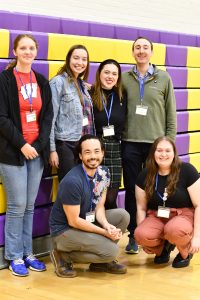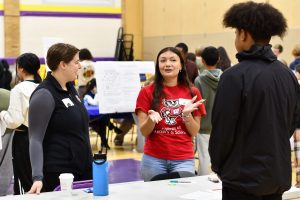Outside Madison East High School, gray clouds have broken into a steady and chilly October rain. Inside East’s brightly colored gymnasium, however, the vibe is decidedly energetic as hundreds of high schoolers move between rows of tables, interacting with researchers from UW-Madison, Edgewood College, and Madison College during the day’s Science Expo, an event run largely by Department of Psychology graduate students.

The students, many of whom volunteered with the first Expo last year, are part of the student-led group Antiracism Learning and Action in Neuroscience (ALAN) at UW-Madison. Driven by the desire both to learn about systemic racism within their institutions and to develop implementable actions in their labs, departments, and communities to support marginalized folks and work towards dismantling systemic racism, ALAN’s members conceived of the Science Expo when considering how they could improve representation in the sciences.
“We’d had some initial looking at the undergrad level and the grad level,” says Duncan Cleveland, Psychology graduate student, but ultimately landed on doing something for high schoolers. “We looked particularly at East High School because there are greater numbers of BIPOC [Black, Indigenous, and People of Color] folks here.”
The Science Expo’s goals are twofold: 1) to expose students to the work scientists do in their labs through research posters and hands-on activities and experiments, and 2) to facilitate interaction between students and researchers who reflect student identities, particularly those from historically underrepresented backgrounds.
Cleveland again: “Going from high school to college, you get equal numbers of kids across racial categories who go in with that [STEM] major, but BIPOC folks are more likely to drop out of the major. You don’t see professors with your identity, there’s no one represented in your field, so it’s easier to trickle out.”

From the high school’s perspective, the Science Expo is a win for the students. Not only do they get to see all the different kinds of application, study, research, and science that’s out there, but they also get to see the people behind the science. “Traditionally, science has been associated with the white male identity and that’s not what science necessarily looks like anymore,” says Annie Potter, East High School’s Personalized Pathways Coordinator and Experiential Learning Coordinator. “We wanted to make it more inclusive to show the students that they have options, and there are people who look like them in the sciences.”
Though teachers provide students with some basic guidance for their time at the Expo (i.e., write down what you learned about presenters, their research, etc.), many students come in eager to connect with the scientists.
“I went twice in one day since there were different tables in the morning and afternoon,” says East High School senior Josie Perez. “I am a soon-to-be psychology major next fall, so getting to meet people who are actually studying and researching different topics in psychology was an amazing experience for me. Being able to see what they do day-to-day in their labs was so fun.”
Pulling together more than 80 volunteers representing 42 different academic programs, labs, and student organizations is no small feat and is done with great intentionality. “It would be easy to come in and say, ‘Let’s just do this program,’ but we wanted a program that works, that’s effective,” says Cleveland, so the team consulted evidence-based research on the most effective outreach programs and sought the guidance of the outreach team at the Morgridge Institute for Research.
“The hope with something like this is that it’s going to be particularly impactful for underrepresented students. It’s both talking about our work as scientists and talking about who we are as people. Being able to see yourself reflected in the scientists around you, being able to feel like you belong in the sciences, we hope, is going to be important for making sure that a student perseveres through the sciences, or if they weren’t interested, to consider the sciences. You get to be who you are, and you get to be a scientist.”